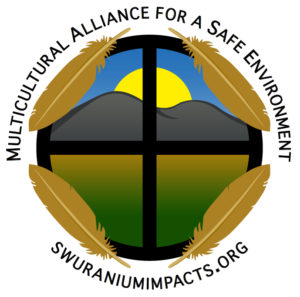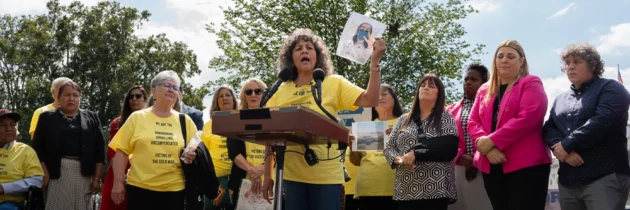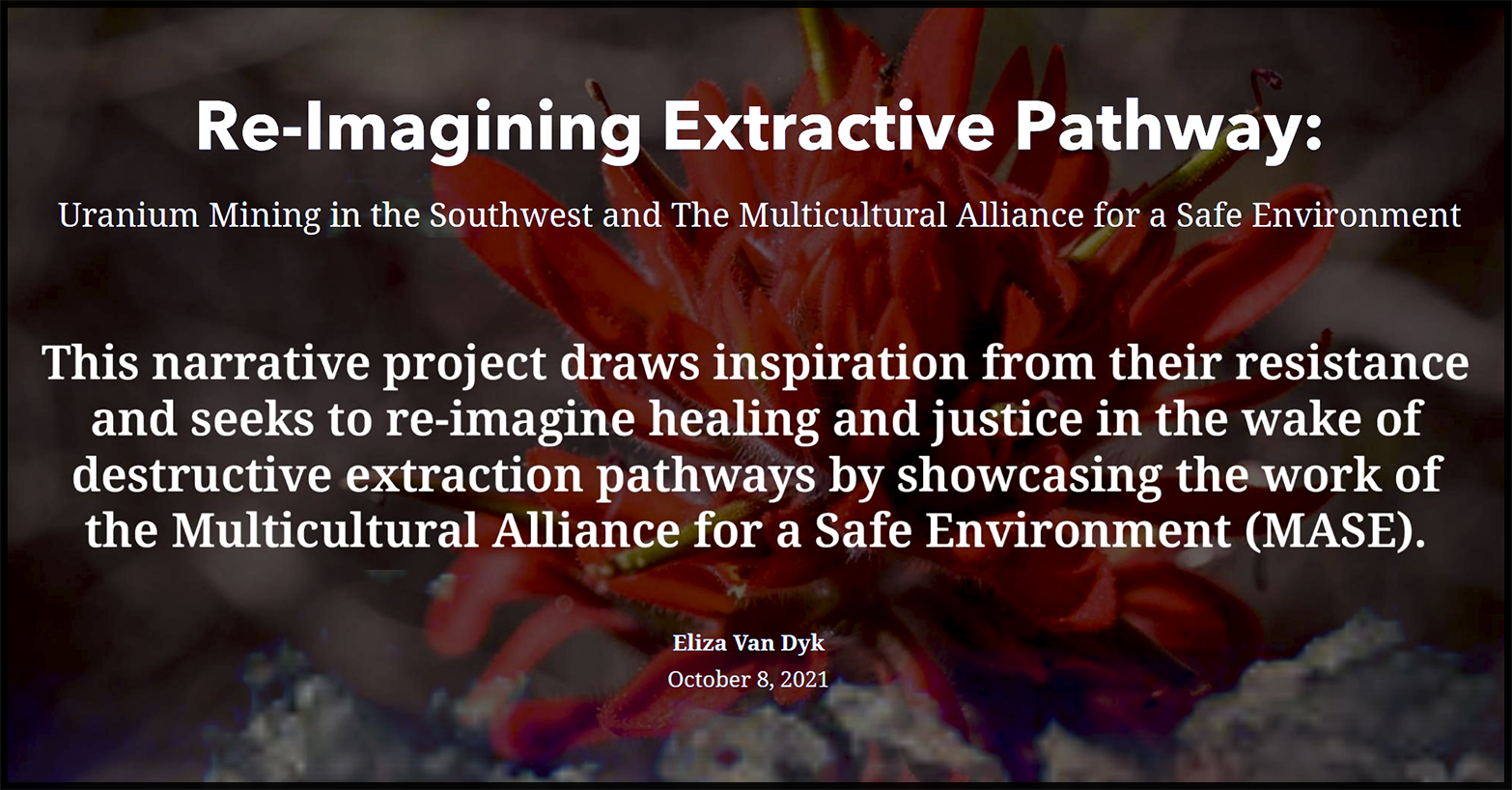Lawmakers, community members say RECA expansion is needed to help the ‘unknowing, unwilling, uncompensated victims of the Cold War’
“You talk about the American dream, our people that engage in mining of uranium did not reach that American dream,” – Phil Harrison, a former miner and a member of the Navajo Uranium Radiation Victims Committee

Tina Cordova holds up a picture of her niece who has been diagnosed with cancer. Cordova says her niece represents the fifth generation in their family to develop cancer due to the nuclear weapon testing in New Mexico. Photo Credit: Office of Sen. Ben Ray Lujan
As the years have passed and people have died of cancer, Navajo Nation communities impacted by uranium mining have lost hope that they will someday receive compensation for the medical conditions resulting from exposure to radioactivity, Phil Harrison said during a press conference on Wednesday.
“We are here in Washington to tell America how freedom was established,” Harrison, a former miner and a member of the Navajo Uranium Radiation Victims Committee, said.
People like Harrison who were exposed to radiation as a result of uranium mining as well as the downwinders who were exposed to radiation after the Trinity nuclear detonation in areas like New Mexico’s Tularosa Basin are closer to receiving compensation than ever before after the U.S. Senate approved an expansion to the Radiation Exposure Compensation Act earlier this year as an amendment to the National Defense Authorization Act.
Now members of the U.S. House of Representatives including Teresa Leger Fernández, a Democrat from New Mexico and James Moylan, a Republican non-voting member who represents Guam, are pushing to have that body of Congress approve the expansion.
U.S. Senators Ben Ray Luján, D-New Mexico, and Josh Hawley, R-Missouri, hosted a press conference on Wednesday and were joined by their colleagues Leger Fernández, Moylan and Sen. Eric Schmitt, R-Missouri, as well as various people from communities impacted by the radiation exposure.
Many of the people who attended, including Harrison, wore yellow shirts that read: “We are the unknowing, unwilling, uncompensated victims of the Cold War.”
‘We’re dealing with death’
Harrison said the miners were largely uneducated and couldn’t read and write.
“You talk about the American dream, our people that engage in mining of uranium did not reach that American dream,” he said.
His father, who worked in the mines, died at age 43 of lung cancer and now Harrison has kidney problems because of the exposure to radioactive material. Hundreds of Navajo people who worked in the mines have died due to that exposure.
“People die very quietly,” Harrison said.
In the last two months, he has facilitated three funerals from deaths that were related to cancer and lung disease.
“The Navajo uranium miners, all those other miners, the Laguna miners, they provided that recipe for the bomb,” Harrison said.
When his kidneys failed, Harrison initially thought he had been bitten by mosquitos. A rash formed on his body and the doctors put him on dialysis. Looking back, he recalls drinking water in the uranium mine.
“Nobody told me ‘don’t drink that. Don’t wade in there,’” he said.
He said the mine companies “never gave anything that would be sustainable. We’re dealing with death.”
Navajo Nation Speaker Crystalyne Curley spoke about the debt that the country owes to the Navajo people. She said that debt occurred over decades with the uranium mining on Navajo Nation that has been “paid in the currency of their health and environment and, in some cases, their lives.”
Between 1944 and 1986, companies extracted nearly 300 million tons of uranium from Navajo Nation lands. This provided opportunities for Navajo people to build a better life for themselves and their families, but it also came at a cost, Curley said. She said her people were not aware of the dangers that uranium mining posed due to a lack of communication. Curley said the uranium mining has resulted in “generations of illnesses and death across Navajo Nation.”
Navajo community members herded livestock to drink contaminated waters, which children also played in. She said they also took lumber and supplies available from the mines to construct their houses.
Now they are paying the cost in medical conditions such as cancer and kidney disease.
‘The government ought to pay the bills’
After learning about the radioactive waste that was disposed of in Missouri and uranium processing that occurred in the St. Louis area that continues to impact people’s health, Hawley called Luján—who has been a long-time champion of expanding RECA—and the two of them worked together in a bipartisan effort to get 61 votes in the Senate.
“We are here to demand justice for the men and women across this country, from St. Louis, Missouri to St. Charles, Missouri to New Mexico and Utah and Guam and every place in between, who have been exposed by their government to radioactive waste radioactive material, and have not been compensated for it,” Hawley said. “Listen, this is a basic principle, if a government is going to create a disaster, the government should clean it up. If the government is going to expose its own citizens to radioactive material, radioactive waste, radioactive contamination for decades, the government ought to pay the bills of the men and women who have gotten sick because of it, they ought to pay for the survivor benefits of those who have been lost.”
In Missouri, radioactive waste led to the closure of Jana Elementary School and a community member who attended the press conference held a sign that read “Justice for Jana Elementary.”
Since the closure, more than 300 dump truck loads of contaminated dirt have been removed from the banks of Coldwater Creek near the school and the community has called for broader levels of testing.
This story is not unique and Hawley said he was able to secure the votes of his Republican colleagues by telling them about ways the expansion could benefit their own constituents.
“Every member of Congress should vote for this,” Hawley said, stating that all 50 states have people who have been impacted by radiation exposure.
In his own state, Hawley pointed to the high levels of childhood brain tumors in St. Louis as a result of the uranium processing.
“Now, we’ve been told for decades that that was just a coincidence. But we know now that’s not true,” he said, adding that federal officials knew that the water and soil in St. Louis had nuclear contamination starting as early as the 1950s and 1960s.
‘This is our history’
Luján spoke about the conditions that uranium miners faced as the mines were often filled with water to keep particulate matter down and the workers would leave with radioactive material on their clothing, which they would bring home to their families.
“Not only were those uranium mine workers getting sick, but then it was spreading to families and countless others,” he said.
The vast majority of the defense-related uranium mining—96 percent—occurred on Navajo Nation lands. Other uranium mining related to defense activities occurred on Pueblo of Laguna and Pueblo of Zuni lands in New Mexico.
He also spoke about downwinders in the Tularosa Basin who have not been compensated for the health impacts atomic weapon testing had on their families. That includes people like Tina Cordova who is the fourth generation in her family to develop cancer as a result of the testing and now has a niece who is fifth generation to develop cancer.
“There are generations behind us whose genes carry this legacy,” she said.
Cordova said there was no running water in her community at the time, so people collected rainwater for drinking, cooking and bathing.
“They didn’t have the decency to let us know that as that ash fell from the sky for days afterwards that it would completely contaminate our water supply,” she said.
There were also no grocery stores, so many people grew their own food, which was also contaminated by the fallout.
“This is our history. This is the legacy of the nuclear development and testing that took place in our country during the Cold War and before,” she said. “And it is time for justice.”
Both Luján and Leger Fernández spoke about the recent film Oppenheimer which documented the work to develop the atomic bomb.
“In New Mexico, the bomb was invented, the bomb was exploded, and the material for the bomb was mined,” Leger Fernández said.
She said the film left out a line that has been included in other documentation, including writings about the Manhattan Project.
“Those who are in charge of considering what the nuclear waste, what the fallout would do to New Mexicans, said, ‘Well, we’re pretty sure there was overexposure. But they can’t prove it. We can’t prove it. So I think we got away with it.’ We are not going to let them get away with it,” she said.
She said the government eventually chose to move that testing to another place in the country that “the United States thought was uninhabited” and then later to Guam and other Pacific Islands.
She said the people participating in the press conference were not making a statement about the value of the work to develop nuclear weapons. Instead, she said the statement they are making is that it is important to compensate those who were harmed in that process.
“It was a marvelous thing they did in 1992, where they recognized that the downwinders, the miners, the workers deserve the kind of specialized health care that they need to address the harm that is done when you are exposed to these materials,” she said, referencing the initial passage of the Radiation Exposure Compensation Act. “What was wrong back then was to inadvertently leave out the communities that are represented here behind me from that compensation.”
The original law did not include downwinders in New Mexico or Guam, nor did it include miners who worked in uranium mines after 1971.
“Justice is not complete until it is justice for all. And that is what we are asking for: justice for everybody who was hurt,” she said.
Leger Fernández said expanding the Radiation Exposure Compensation Act is about saving lives. She said it will allow people who were exposed to radiation to receive testing for various cancers.
“If we could actually get out to all of the miners who mined after 1971 and make sure that they get the health screening—do you have any of these cancers that can be caused from this mining—we could save their lives,” she said.






